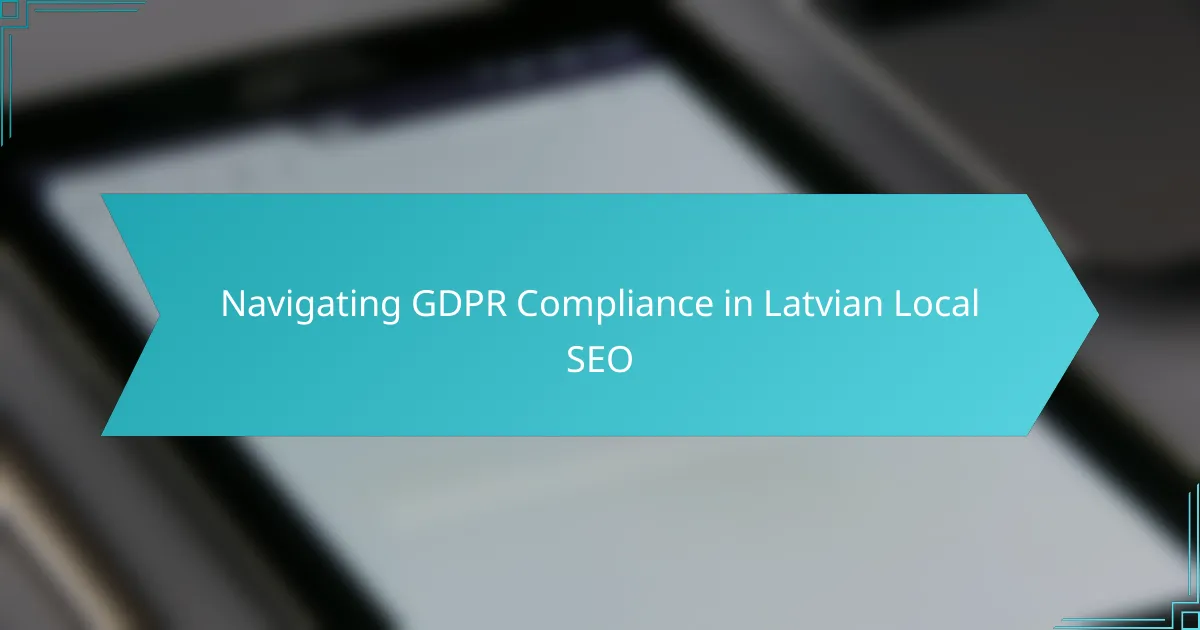Navigating GDPR compliance is crucial for local businesses in Latvia, as it directly impacts their SEO strategies and online visibility. By implementing strong data protection measures and understanding key principles such as consent and data minimization, businesses can safeguard personal information while enhancing customer trust. This balance between compliance and optimization is essential for success in the competitive local market.
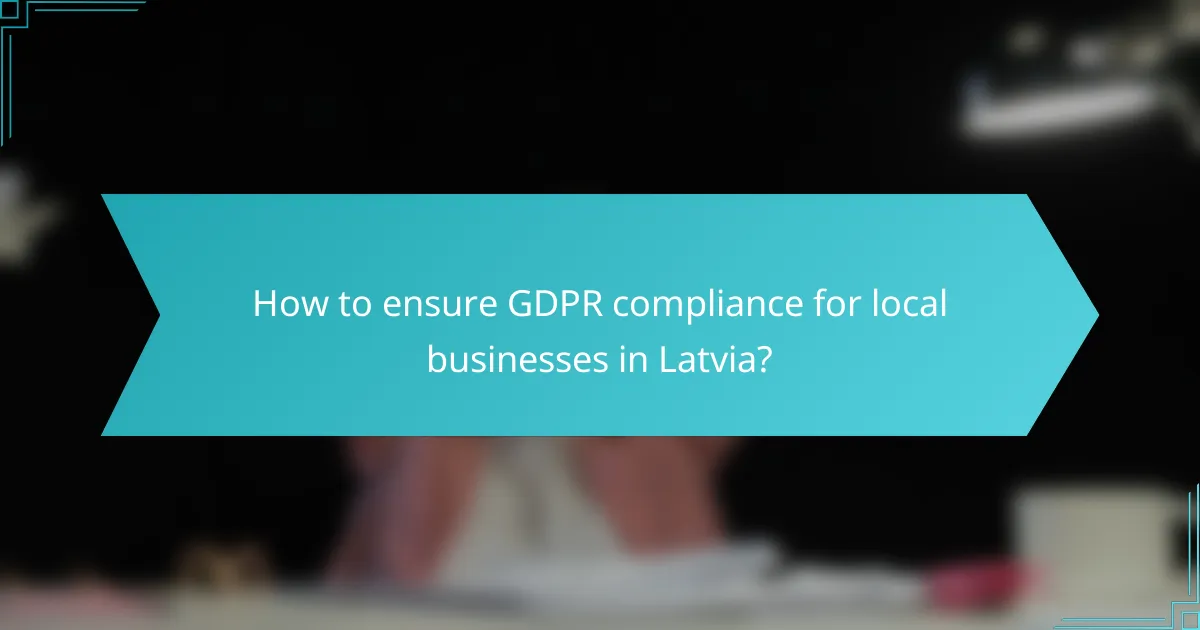
How to ensure GDPR compliance for local businesses in Latvia?
To ensure GDPR compliance for local businesses in Latvia, it is essential to implement robust data protection measures, regularly audit practices, and train staff on relevant regulations. This approach helps safeguard personal data and builds customer trust.
Implement data protection policies
Establishing clear data protection policies is crucial for GDPR compliance. These policies should outline how personal data is collected, processed, stored, and shared. Ensure that all data handling practices align with GDPR principles, such as data minimization and purpose limitation.
Consider creating a privacy policy that is easily accessible to customers, detailing their rights and how their data will be used. Regularly review and update these policies to reflect any changes in operations or regulations.
Conduct regular audits
Regular audits are vital for assessing compliance with GDPR regulations. These audits should evaluate data processing activities, identify potential risks, and ensure that all policies are being followed. Aim to conduct these audits at least annually or whenever significant changes occur in your business operations.
During audits, check for proper documentation of data processing activities and ensure that consent mechanisms are in place. This proactive approach helps in identifying gaps and mitigating risks before they lead to potential fines.
Train staff on GDPR requirements
Training staff on GDPR requirements is essential for fostering a culture of data protection within your organization. Provide comprehensive training sessions that cover the basics of GDPR, the importance of data privacy, and specific responsibilities related to data handling.
Consider using practical examples and case studies relevant to your business to illustrate the consequences of non-compliance. Regular refresher courses can help keep staff updated on any changes in regulations or company policies.
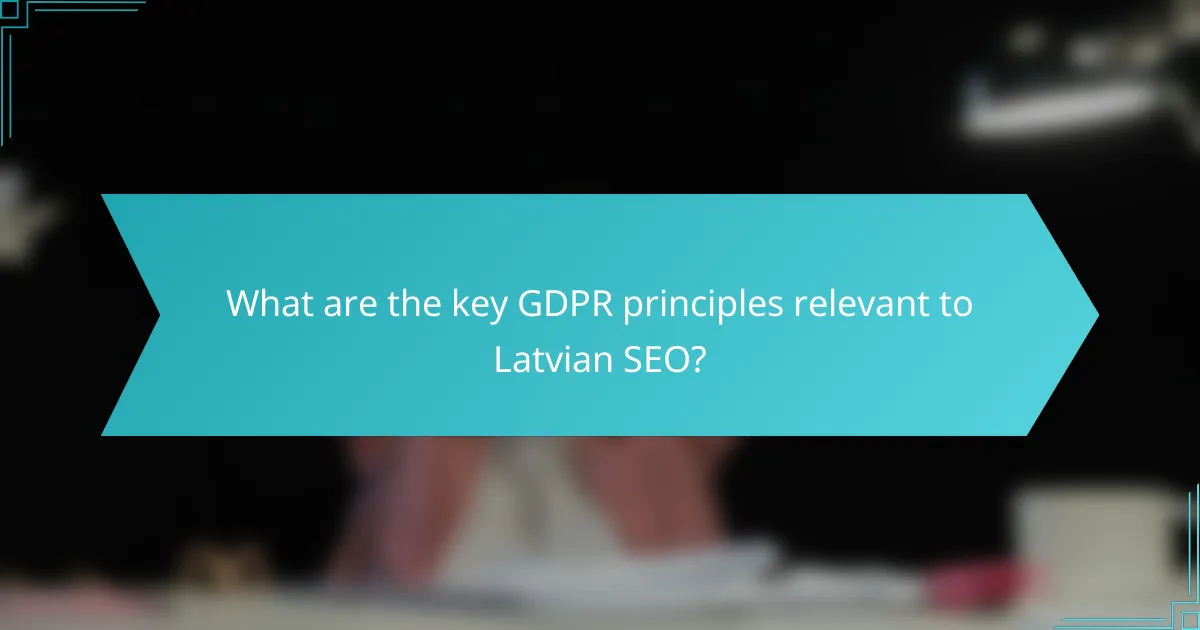
What are the key GDPR principles relevant to Latvian SEO?
The key GDPR principles relevant to Latvian SEO include data minimization, consent requirements, and the right to access personal data. Understanding these principles is crucial for businesses operating in Latvia to ensure compliance while optimizing their online presence.
Data minimization
Data minimization requires that businesses only collect personal data that is necessary for their specific purposes. In the context of SEO, this means avoiding the collection of excessive user information that does not directly contribute to improving website performance or user experience.
For example, if a website only needs an email address for newsletter subscriptions, it should not ask for additional personal details like phone numbers or addresses. Regularly review data collection practices to ensure compliance with this principle.
Consent requirements
Under GDPR, obtaining explicit consent from users before collecting their personal data is mandatory. This means that businesses must provide clear information about what data is being collected and how it will be used, ensuring users can make informed decisions.
In Latvia, consent must be freely given, specific, informed, and unambiguous. For instance, a website should use checkboxes for users to opt-in to data collection rather than pre-checked boxes. Regularly audit consent mechanisms to ensure they meet these criteria.
Right to access
The right to access allows individuals to request information about the personal data a business holds about them. Businesses must respond to these requests promptly and provide clear details about the data collected and its usage.
In practice, this means having a process in place to handle access requests efficiently. For example, a user might ask for a copy of their data collected through a contact form. Ensure that your website includes a straightforward method for users to submit such requests, and establish a timeline for responses to comply with GDPR regulations.
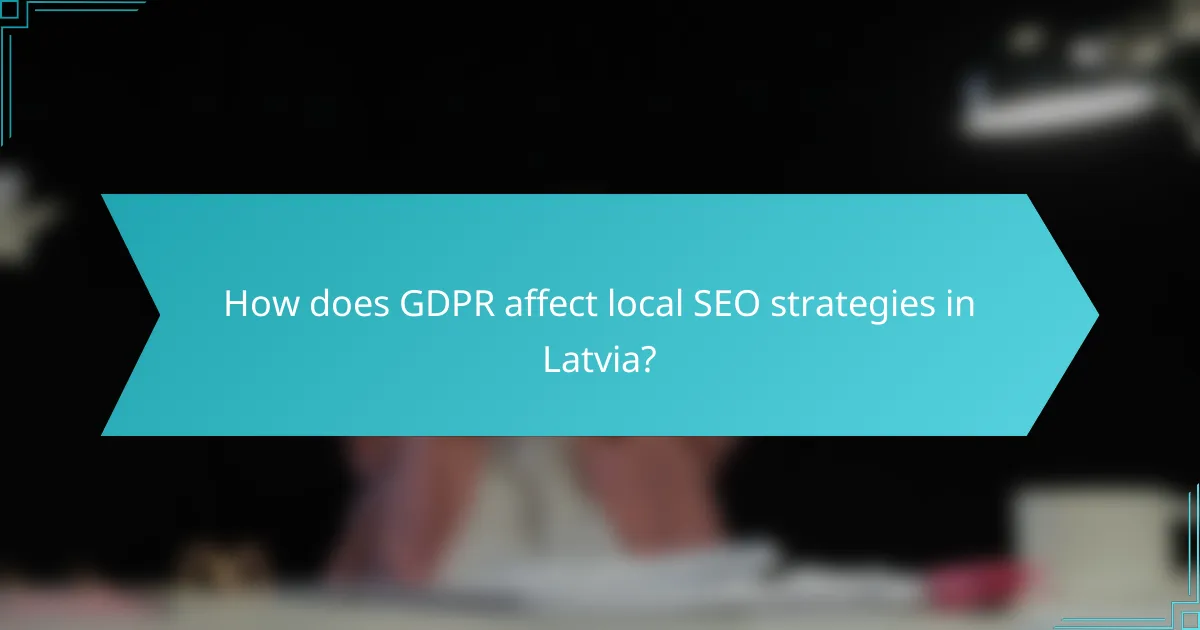
How does GDPR affect local SEO strategies in Latvia?
GDPR significantly impacts local SEO strategies in Latvia by imposing strict regulations on data handling and user privacy. Businesses must ensure compliance while optimizing their online presence, which can influence their visibility in local search results.
Impact on data collection
GDPR requires businesses to obtain explicit consent from users before collecting personal data. This means that local SEO strategies must prioritize transparency in data collection practices, ensuring users know what data is being collected and how it will be used.
For example, businesses should implement clear consent forms on their websites and provide easy access to privacy policies. Failure to comply can lead to hefty fines, which can affect a company’s reputation and local search rankings.
Influence on customer trust
GDPR compliance can enhance customer trust, as users are more likely to engage with businesses that prioritize their privacy. By demonstrating a commitment to data protection, companies can build stronger relationships with local customers.
To foster trust, businesses should communicate their GDPR compliance efforts through marketing materials and website content. Highlighting secure data practices can differentiate a brand in competitive local markets.
Changes in keyword targeting
With GDPR’s focus on user privacy, keyword targeting strategies may need to shift. Businesses should consider using less intrusive keywords that align with user intent while respecting privacy concerns.
For instance, instead of targeting broad terms that may imply data collection, focus on specific local keywords that reflect user needs without compromising privacy. This approach can improve relevance and search visibility while adhering to GDPR guidelines.

What tools can help with GDPR compliance in Latvia?
Several tools can assist businesses in Latvia with GDPR compliance, focusing on data protection, user consent, and data mapping. Utilizing the right tools can simplify the process of adhering to regulations while enhancing local SEO efforts.
OneTrust for compliance management
OneTrust is a comprehensive compliance management platform that helps organizations manage their GDPR obligations effectively. It offers features such as risk assessments, privacy impact assessments, and policy management, which are crucial for maintaining compliance in Latvia.
By automating compliance tasks, OneTrust allows businesses to focus on their core operations while ensuring they meet regulatory requirements. It is particularly useful for tracking changes in data protection laws and managing user consent.
GDPR Cookie Consent for website tracking
GDPR Cookie Consent is a tool that enables websites to manage user consent for cookies and tracking technologies. This is essential for businesses operating in Latvia, where obtaining explicit consent from users is a legal requirement under GDPR.
The tool helps create customizable cookie banners, allowing users to choose their preferences regarding data collection. This not only aids in compliance but also builds trust with users by being transparent about data usage.
DataGrail for data mapping
DataGrail is a data privacy management tool that specializes in data mapping and inventory. It helps businesses in Latvia identify and manage personal data across their systems, which is vital for GDPR compliance.
With DataGrail, organizations can easily visualize where personal data resides, how it is used, and ensure that they can respond to data subject requests efficiently. This capability is essential for maintaining compliance and avoiding potential fines.
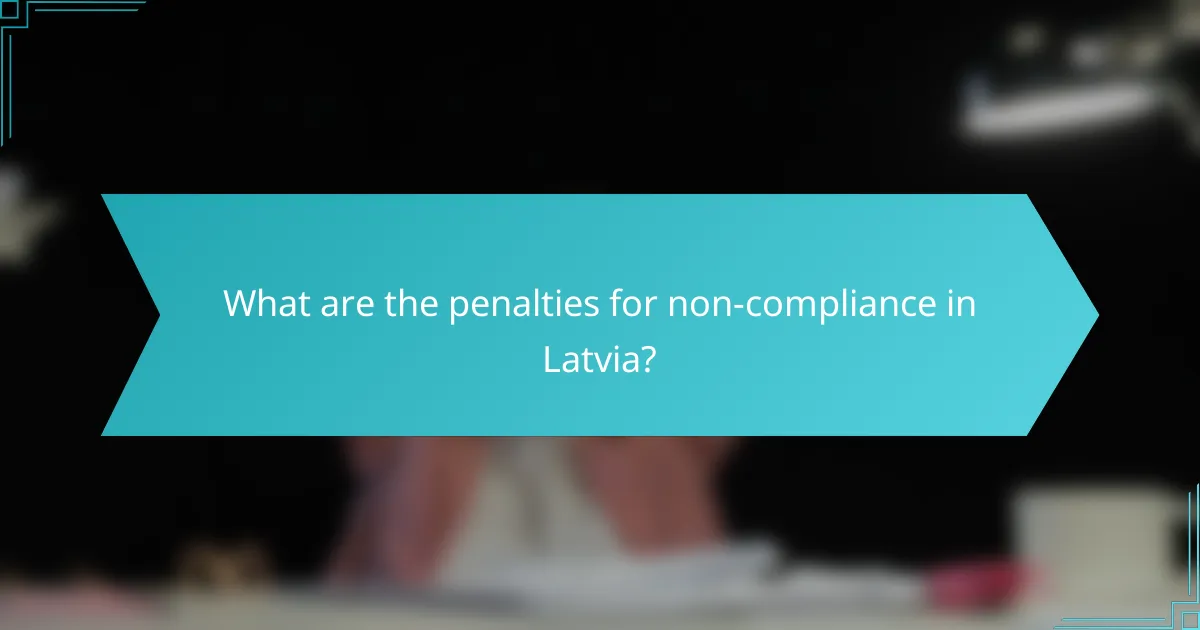
What are the penalties for non-compliance in Latvia?
In Latvia, non-compliance with GDPR can lead to significant penalties, including hefty fines, reputational harm, and potential legal actions from consumers. Understanding these consequences is crucial for businesses operating in the region to ensure they adhere to data protection regulations.
Fines up to €20 million
One of the most severe penalties for GDPR non-compliance in Latvia is the possibility of fines reaching up to €20 million or 4% of a company’s global annual turnover, whichever is higher. This substantial financial risk emphasizes the importance of implementing robust data protection measures.
Businesses should regularly assess their compliance status and be proactive in addressing any vulnerabilities in their data handling processes. Investing in GDPR training and compliance audits can help mitigate the risk of incurring these fines.
Reputational damage
Non-compliance with GDPR can lead to significant reputational damage for businesses in Latvia. Customers are increasingly aware of their data rights, and any breach can result in a loss of trust, which may take years to rebuild.
To protect their reputation, companies should prioritize transparency in their data practices and communicate openly with customers about how their data is used. Engaging in community outreach and demonstrating a commitment to data protection can help mitigate reputational risks.
Legal actions from consumers
Consumers in Latvia have the right to take legal action against businesses that fail to comply with GDPR. This can include seeking compensation for damages resulting from data breaches or mishandling of personal information.
To minimize the risk of legal actions, businesses should establish clear data protection policies and ensure that they are easily accessible to consumers. Regularly updating privacy notices and providing avenues for customers to exercise their rights can further reduce the likelihood of legal disputes.
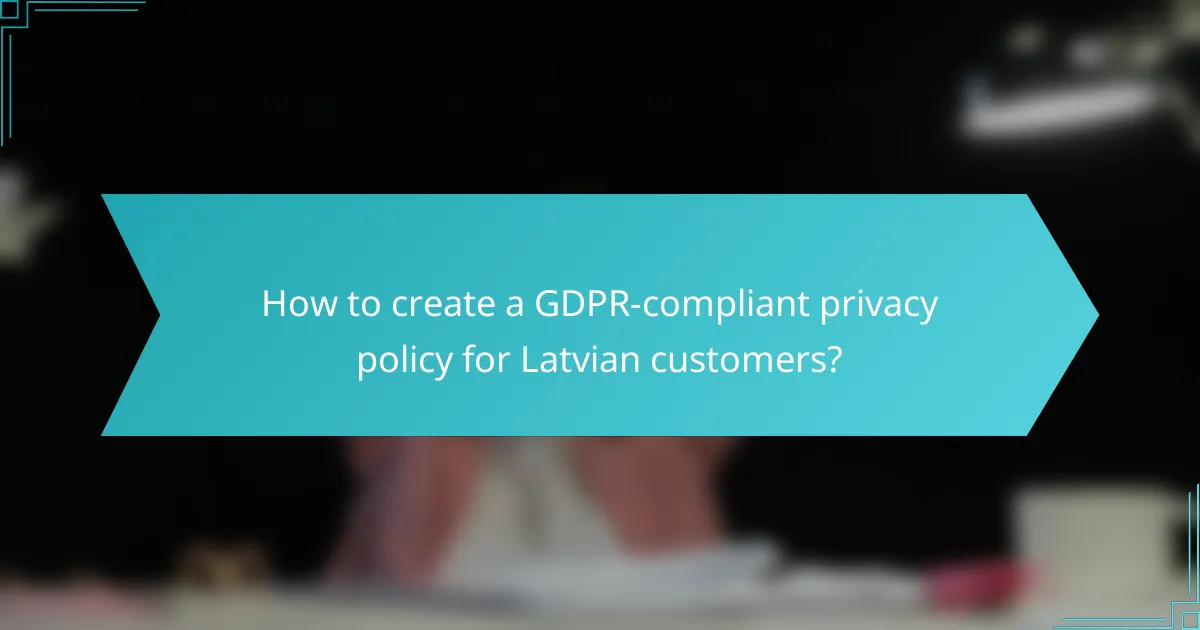
How to create a GDPR-compliant privacy policy for Latvian customers?
To create a GDPR-compliant privacy policy for Latvian customers, ensure that it clearly outlines how personal data is collected, used, and protected. This policy must be easily accessible and written in straightforward language to foster transparency and trust.
Include clear data usage explanations
Data usage explanations should detail what personal information is collected, the purpose of its collection, and how it will be processed. For instance, if you collect email addresses for newsletters, specify that these addresses will only be used for sending updates and not shared with third parties.
Be specific about the types of data you handle, such as names, contact details, and browsing behavior. This clarity helps customers understand their rights and how their data is managed, aligning with GDPR requirements.
Consider using bullet points to summarize key data usage points, making it easier for customers to digest the information quickly. For example:
- Data collected: Name, email, phone number
- Purpose: Sending newsletters and promotional offers
- Retention period: Data retained for three years unless consent is withdrawn
